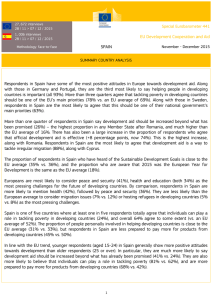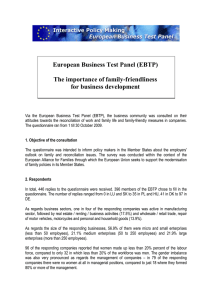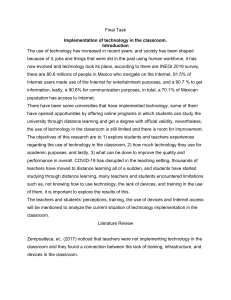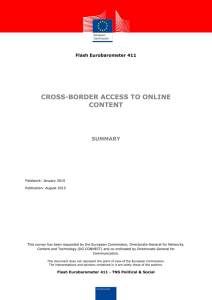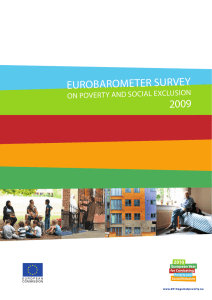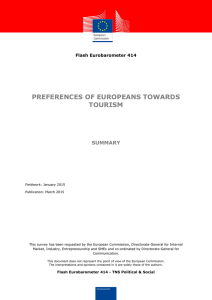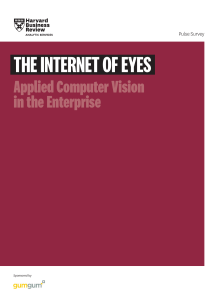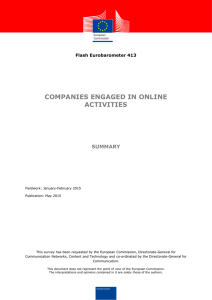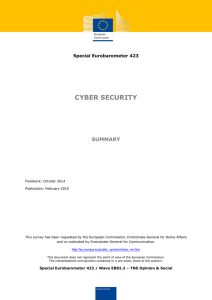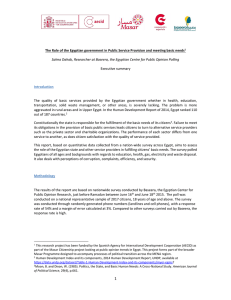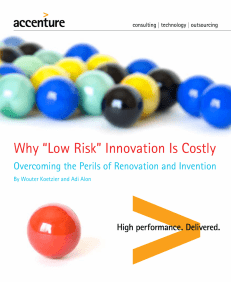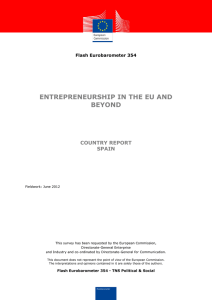Young People
Anuncio
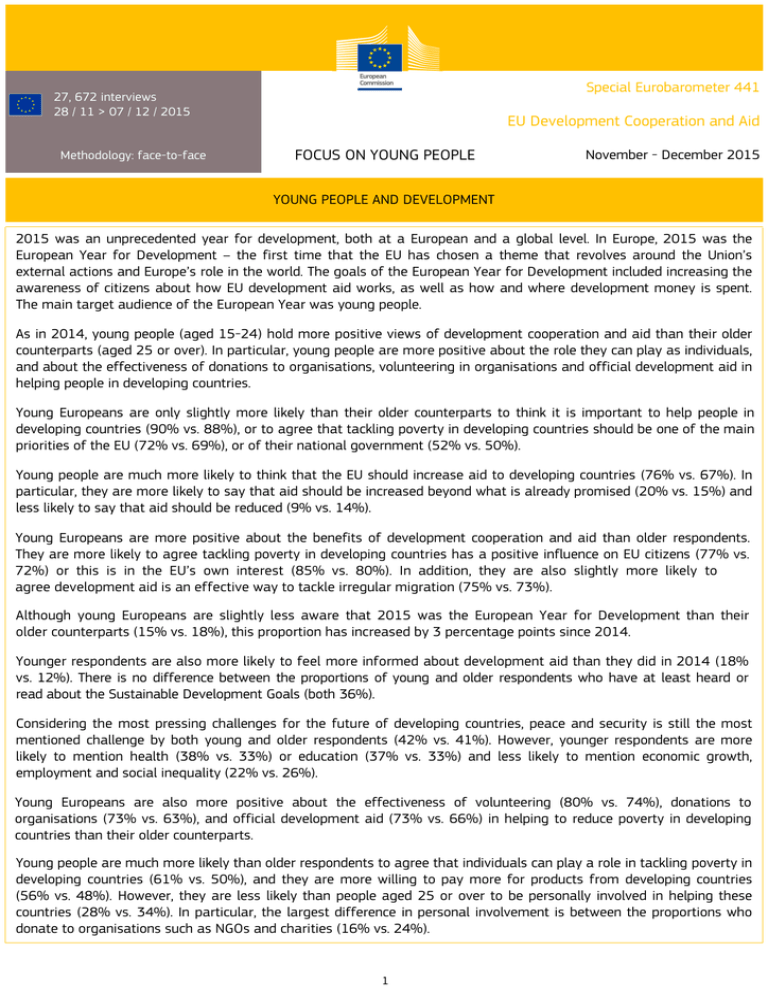
Special Eurobarometer 441 27, 672 interviews 28 / 11 > 07 / 12 / 2015 Methodology: face-to-face EU Development Cooperation and Aid FOCUS ON YOUNG PEOPLE November - December 2015 YOUNG PEOPLE AND DEVELOPMENT 2015 was an unprecedented year for development, both at a European and a global level. In Europe, 2015 was the European Year for Development – the first time that the EU has chosen a theme that revolves around the Union’s external actions and Europe’s role in the world. The goals of the European Year for Development included increasing the awareness of citizens about how EU development aid works, as well as how and where development money is spent. The main target audience of the European Year was young people. As in 2014, young people (aged 15-24) hold more positive views of development cooperation and aid than their older counterparts (aged 25 or over). In particular, young people are more positive about the role they can play as individuals, and about the effectiveness of donations to organisations, volunteering in organisations and official development aid in helping people in developing countries. Young Europeans are only slightly more likely than their older counterparts to think it is important to help people in developing countries (90% vs. 88%), or to agree that tackling poverty in developing countries should be one of the main priorities of the EU (72% vs. 69%), or of their national government (52% vs. 50%). Young people are much more likely to think that the EU should increase aid to developing countries (76% vs. 67%). In particular, they are more likely to say that aid should be increased beyond what is already promised (20% vs. 15%) and less likely to say that aid should be reduced (9% vs. 14%). Young Europeans are more positive about the benefits of development cooperation and aid than older respondents. They are more likely to agree tackling poverty in developing countries has a positive influence on EU citizens (77% vs. 72%) or this is in the EU’s own interest (85% vs. 80%). In addition, they are also slightly more likely to agree development aid is an effective way to tackle irregular migration (75% vs. 73%). Although young Europeans are slightly less aware that 2015 was the European Year for Development than their older counterparts (15% vs. 18%), this proportion has increased by 3 percentage points since 2014. Younger respondents are also more likely to feel more informed about development aid than they did in 2014 (18% vs. 12%). There is no difference between the proportions of young and older respondents who have at least heard or read about the Sustainable Development Goals (both 36%). Considering the most pressing challenges for the future of developing countries, peace and security is still the most mentioned challenge by both young and older respondents (42% vs. 41%). However, younger respondents are more likely to mention health (38% vs. 33%) or education (37% vs. 33%) and less likely to mention economic growth, employment and social inequality (22% vs. 26%). Young Europeans are also more positive about the effectiveness of volunteering (80% vs. 74%), donations to organisations (73% vs. 63%), and official development aid (73% vs. 66%) in helping to reduce poverty in developing countries than their older counterparts. Young people are much more likely than older respondents to agree that individuals can play a role in tackling poverty in developing countries (61% vs. 50%), and they are more willing to pay more for products from developing countries (56% vs. 48%). However, they are less likely than people aged 25 or over to be personally involved in helping these countries (28% vs. 34%). In particular, the largest difference in personal involvement is between the proportions who donate to organisations such as NGOs and charities (16% vs. 24%). 1 Special Eurobarometer 441 27, 672 interviews 28 / 11 > 07 / 12 / 2015 Methodology: face-to-face EU Development Cooperation and Aid FOCUS ON YOUNG PEOPLE November - December 2015 1. IMPORTANCE OF AND ATTITUDES TOWARDS DEVELOPMENT COOPERATION AND AID QA1 QA5 QA7.2 QA7.3 2 Special Eurobarometer 441 27, 672 interviews 28 / 11 > 07 / 12 / 2015 EU Development Cooperation and Aid FOCUS ON YOUNG PEOPLE Methodology: face-to-face November - December 2015 2. BENEFITS OF DEVELOPMENT COOPERATION AND AID QA7.4 QA7.5 QA7.7 QA7.8 3 Special Eurobarometer 441 27, 672 interviews 28 / 11 > 07 / 12 / 2015 Methodology: face-to-face EU Development Cooperation and Aid FOCUS ON YOUNG PEOPLE November - December 2015 3. AWARENESS OF UNITED NATIONS' SUSTAINABLE DEVELOPMENT GOALS QA10 QA10R 4. AWARENESS OF "2015 - THE EUROPEAN YEAR FOR DEVELOPMENT" AND DEVELOPMENT IN GENERAL QA2 QA3 4 Special Eurobarometer 441 27, 672 interviews 28 / 11 > 07 / 12 / 2015 Methodology: face-to-face EU Development Cooperation and Aid FOCUS ON YOUNG PEOPLE November - December 2015 5. UNDERSTANDING THE CHALLENGES FACING DEVELOPING COUNTRIES QA4 6. EFFECTIVENESS OF DIFFERENT TYPES OF ACTION QA9 5 Special Eurobarometer 441 27, 672 interviews 28 / 11 > 07 / 12 / 2015 Methodology: face-to-face EU Development Cooperation and Aid FOCUS ON YOUNG PEOPLE November - December 2015 7. PERSONAL COMMITMENT TO AND INVOLVEMENT IN DEVELOPMENT QA7.1 QA6 QA8 QA8R 6
